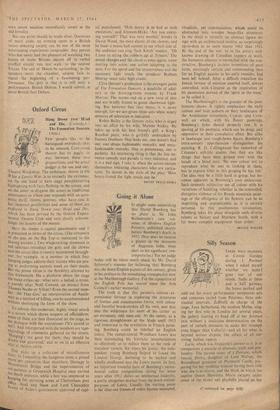Oxford Circus
Hang Down your Had and Die. (Comedy.) — '44 The Formation. Dancers. (Arts.)
FEW people like to be harangued: everyboi■ ikes to be amused. Com ,i.tted theatre has to jugkle. way between these two propositions, and the artful dodger is the one and only Theatre Workshop. The technique, shown in Olt What a Lovely War, is to intensify the extremes; on the one hand to have stage pamphleteering highlighting with facts flashing on the screen, and on the other to disguise the actors as traditional entertainers to whom one responds with an auto- matic thrill, clowns, pierrots, what have you. It has immense possibilities and some of them are explored in 'Hang Down your Head and Die, which has been devised by the Oxford Experi- mental Theatre Club and very clearly acknow- ledges the lessons of the master.
Here the theme is capital punishment and it is presented in terms of the circus. (The virtuosity of the pun on the Big Top is restrained to the closing number.) Two whiperacking showmen in red tailcoats introduce the girls and the clowns and the circus idea is loosely maintained through- out; for example, in a number in which four hanging judges address their victims who are pos- ing as performing animals meek on their stools. But the prime virtue is the flexibility allowed by this framework. On a platform above the stage the band strikes up: what next, a ballad, a mime, a Parody after Noill Coward, an extract from Thomas Nashe or Villon? Even the second num- ber, 'All That Gas,' an interpretation of Ausch- witz as a method of killing, can be accommodated Without destroying the form of the show.
To inform this exuberant, highly visual attack is a screen which shows snippets of officialdom; some of these are then illustrated on the stage, as the dialogue with the executioner (It's sacred to 'rte.). And interspersed with the numbers are tape- recordings of comments gathered on the streets. Hanging's too good for them, they should be drawn and quartered,' and so on in an effective shot at thaitre-verile.
One picks up a coltectiOn of miscellaneous 'acts. In Lancashire the hangman earns a pound more per execution than elsewhere. Damage to Westminster Bridge and the impersonation of out-patients at Greenwich Hospital once carried the death sentence, while a boy was sentenced to hanging for secreting notes at Cheltenham post office. Joad and Shaw and Lord Chancellor iowett of Attlee's government approved of capi- tal punishment. 'Mob mercy is as bad as mob execution,' said Joynson-Hicks. 'Are you enjoy- ing yourself? That was very morbid,' breaks in David Wood, the most elastic of the clowns, and he leads a music-hall contest to see which side of the audience can sing 'Jack Ketch' loudest : 'Oh I love to string the robbers up at Tyburn.' The mood changes and the circus is away again, scene melting into scene, one action adapting to the next. For the speed and the inventiveness and the necessary light touch, the producer Braham Murray must take high credit.
Clive Donner's production is the strongest point of The Formation Dancers, a quadrille of adul- tery in the drawing-room manner by Frank Marcus. The scenes end on a new twist of plot and are briefly frozen in green chartreuse light- ing. But however fast they move, it is never enough, for we are given three acts when ninety minutes of television is -indicated.
Robin Bailey is the literary critic who is urged into an affair by his wife, Maxine Audley. He takes up with his best friend's 'girl, a King's Roadish piece, who is girlfully undertaken by Joanna Dunham. One finds out, one doesn't find out, one drops fashionable remarks, and meta- fashionable remarks. One is pretentious, one is pathetic. An interesting thing is that the line be- tween comedy and parody is very indistinct, and it is a bad sign, I take it, when the actors imitate themselves imitating characters who are carica- tures. To invent in the style of the play, 'How heavy-footed the light touch can be.'
DAVID PRYCE-JONES


































 Previous page
Previous page